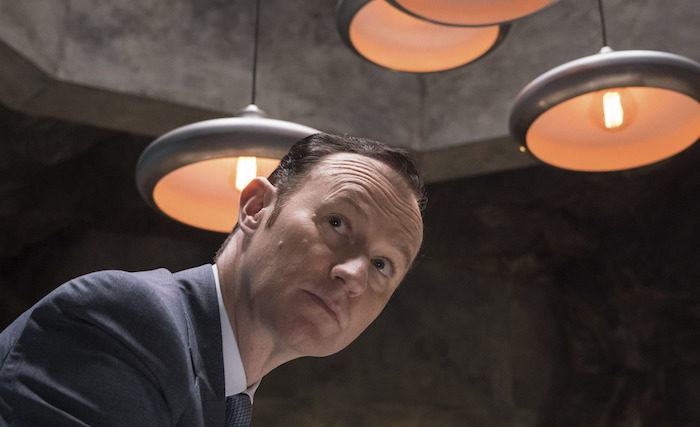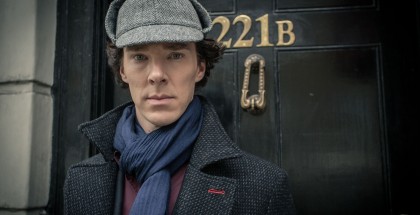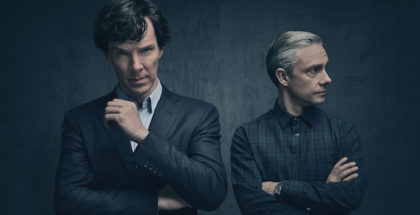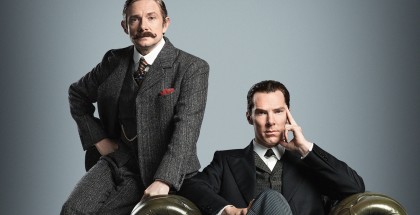Netflix UK TV review: Sherlock Season 4, Episode 3 (The Final Problem)
Review Overview
Emotional context
8Cast
8Up in the air
5David Farnor | On 22, Jan 2017
Warning: This contains minor spoilers. Already seen the episode? Read on at the bottom for additional, spoilery notes.
“For God’s sake, this is not one of your idiot cases!” snaps Mycroft Holmes (Mark Gatiss) at John Watson (Martin Freeman) in The Final Problem. Later, he dismisses him again, but for entirely different reasons. “This is family!” he insists.
That’s the entirety of Sherlock’s fourth season in a nutshell, precisely what makes the BBC’s modern version of the show so brilliant and so frustrating. The series has increasingly moved further and further away from its roots, leaving behind the routine crime-of-the-week in favour of character-centric stories. If Season 3 bet on fans wanting emotion to be an elementary part of this Holmes, Season 4 has doubled down, building up to the reveal of the show’s all-time big bad: Eurus Holmes (Sian Brooke), the secret sister of Sherlock and Mycroft. Sherlock solving cases? Forget that. The real mystery is his family.
It’s a departure that pays off in subtle depths. The downside? You have to get past the surface first.
Eurus, it swiftly becomes clear, is a real piece of work. Smarter and crueller than both her siblings put together, Sian Brooke’s performance is every bit the villain that this season’s opening episode was missing – creepy, clever and believably hypnotic, in her apparent ability to talk around anyone to do what she wants. That puts Season 4’s finale (penned by Steven Moffat and Mark Gatiss) on an immediately better track than the first instalment, pushing Mary and her distracting subplot to one side to focus on the detecting duo that people signed up for.
But even then, there are obstacles you need to leap. Within minutes, we find our duo back at 221b Baker Street, where a drone crashes through the living room window carrying a “patience grenade”, which is triggered by movement. And so Sherlock and Watson dive out the first-floor windows, while Mycroft runs down the stairs. Everyone surviving a property-destroying detonation without any visible injuries? People’s patience on the verge of exploding is about right. An introductory sequence that sees Mycroft fend off an assault from a sinister clown (hello to his John Steed-style sword) only makes things feel more self-indulgent.
Sherrinford, that opening teaches us, is the name of the fortress on a remote island where Eurus is kept, which prompts Sherlock, Watson and Mycroft to hop in a boat to confront her. What ensues is a string of fiendish challenges, all set by Eurus, who has, of course, taken over the asylum. If you complained that Sherlock’s fourth run didn’t contain enough case-solving, this is a fierce rebuttal, as the trio have to crack puzzle after puzzle in quick succession, all designed to torment them emotionally and morally. People hang (the Garridebs – a nod to Arthur Conan Doyle’s books), others are shot, and all the while, we hear sinister sneers and sniggers from their captive audience. It’s a neat enough sequence, if you can forget that this is basically Fort Boyard without the tiger, but it’s dressed up in a typically dense package that threatens to overwhelm it at every step.
A reveal involving Eurus’ cell is simultaneously daft and dazzling, while a brief glimpse of Andrew Scott’s criminal mastermind is a standout piece of scene-stealing, but both are superfluous, the kind of flourish that’s designed to make things deliberately hard to fathom. This is the problem with Sherlock’s most recent episodes; the tricksy structure feels less clever and more intentionally obfuscatory. You can tell how much it detracts from the central narrative at hand by how little we care about the collateral damage from Eurus’ scheme – the prison governor’s wife is paraded as a hostage during one puzzle, to little or no tension whatsoever.
It’s revealing, by contrast, that the most powerful moment in the episode belongs to Louise Brealey’s Molly Hooper, who gets a fateful phone call from Sherlock. Brealey’s heartbreak is both audible and genuinely moving, while Benedict Cumberbatch’s reaction also feels sincere enough for the scene to land on both sides of the receiver, without cheating Molly’s character – this, you suspect, is finally the moment where they honestly connect. It’s a shame, then, that we get no follow-up from this, because the runtime is so packed with other nonsense.
All of this builds up to the big climax: a case that Sherlock has been trying to solve since he was a boy. As a child, Eurus hid his dog, Redbeard, down a well, but he failed to work out where Redbeard was, a loss that deeply scarred him. The idea that this has since led him to become the detached, puzzle-obsessed detective we know today is a wonderful piece of writing, giving Cumberbatch’s sleuth a tragic side that’s more satisfying than any mystery – the case we crack, rather, is the character of Sherlock himself. “The man you are today is your memory of Eurus,” observes Mycroft (Gatiss is, like Martin Freeman, on top form throughout). After Eurus taunting her brother that she was forcing him to make tough choices under duress to “give him emotional context”, that’s precisely what The Final Problem ends up doing.
With the blown-up apartment being reassembled come the end credits, there’s something Batman-like about the way that Moffat and Gatiss have deconstructed and reassembled their iconic hero over four seasons – and it’s fitting that this outing should come with the kind of legend-defining closing montage that feels like a fond farewell to our Baker Street boys. It’s these kind of moments, such as when Lestrade observes that Sherlock remembers his first name – “He’s better than a great man: he’s a good one” – that makes the BBC’s series such classy entertainment. If only the writers didn’t have to surround them with an entire subplot involving a plane about to crash into a city. Is the result a great final problem for Sherlock? No, but it’s a good one. And for all its flaws, that’s still something to celebrate.
Sherlock Season 4 is available on Netflix UK, as part of an £9.99 monthly subscription. It is also available on BritBox, as part of a £5.99 monthly subscription.
Where can I buy or rent Sherlock online in the UK?
Case notes (spoilers)
– The plane subplot, of course, is the episode’s biggest red herring – and biggest mistake. Throughout the episode, Sherlock keeps receiving phone calls from a girl apparently on a flight that’s about to crash, with Moriarty’s voice on the captain’s radio and only Holmes able to guide her to land the craft. Come the finale, though, it becomes apparent in the last puzzle that Eurus has actually been the girl on the phone all along; there is no plane, just her scared inner child trying to reach out to her brother. That, in itself, is just about sold by Sian Brooke’s performance, but it’s the fallout that really fails to stick the landing: Sherlock bursts into her bedroom in their old family home (because after their trip to Fort Boyard ends, she drugs them and transports them to the Holmes estate, where Watson is trapped down a well, a la Redbeard) and he gives her a hug – and in that embrace, she suddenly stops being evil, helps to rescue John and goes back to her cell without causing any bother. You know, the cell that – and here was a nifty twist – that has no glass walls, because she’d tricked the guards.
– While Eurus’ intellect is no doubt formidable, you do wonder how it was possible for her to saunter over to the mainland multiple times without Mycroft realising. And what’s to stop her doing it again?
– Redbeard, meanwhile, turns out not to be Sherlock’s dog, but his childhood friend – a reveal that only makes you wonder why the police seemed not to be involved in this fatal incident from his childhood, let alone why Sherlock would a. forget it all, b. not ever have discussed this with his parents or Mycroft since, and c. not have accidentally discovered a news article about it one day in a Google search. Mycroft, after all, wasn’t a member of MI5 when he was a kid.
– How little some of these logic gaps bother you during the episode is a testament to how good the cast are, when it comes to keeping you emotionally involved enough not to let your brain cogs start spinning. The “this is family!” exclamation from Mycroft above, for example, comes from the point at which Eurus orders Sherlock to shoot either Mycroft or Watson – and Mycroft pretends to be cruel and insult Watson, to convince Sherlock to shoot him instead. It’s a great little exchange, and a nice contrast to the comic scenes involving the trio (“You have to sit in the chair or he won’t talk to you…”), not to mention the disguises, from the start of the episode.
– But it’s all too apt that the typically uneven final sting of emotion comes from Mary Watson, the show’s most misused character. How on earth she managed to record so many DVDs containing video messages to watch after her death is the real final problem Sherlock leaves unsolved. Was their some kind of bulk discount on? Did she not know how to use YouTube? Did she live above a Comet staffed by people entirely from the 1990s? Did it make sense? No. Was it subtle? No. Did it leave you wanting more Sherlock? Yes. And that, ladies and gentlemen, is why the programme remains such a conundrum to so many. Before the BBC rushes to renew it for a fifth season, though, perhaps they should wait 10 years to give us something more akin to Ian McKellen’s Mr. Holmes?
Photo: Hartswood Films / Joss Barrett























